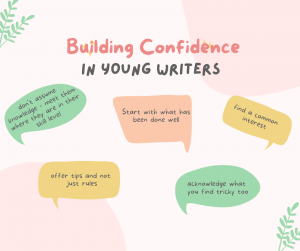As the school year begins and I meet the new students in my writing classes at Online Scribblers, I am reminded of just how complex a subject writing is and what a great responsibility and honor it is to teach it.
Yes, some students come to me with great enthusiasm, full of ideas and grand characters and plots filling their imaginations. But far more come to their first day of class with a dread of writing and a fear of being tasked with filling a blank page with words. Often students tell me that they don’t know what to “say”.
But I think they have a lot to say. They just don’t know if what they have to say will be “right”. This is a fair concern, since most of education is founded on answering questions correctly and finding the “right” answer. But this just doesn’t work when teaching writing. This idea of right and wrong must be abandoned in the writing classroom. We can’t just teach the skills associated with putting words on paper. We must also teach and instill writing confidence.
Teacher & Psychologist
When I started Online Scribblers more than 10 years ago, I thought my job was simply to teach the structure of a paragraph, the role of a thesis, and the job of a comma. I have always been a prolific and avid writer, so the sheer number of students labeled as “reluctant” writers surprised me. I actually think labeling a student a “reluctant” writer is detrimental to their success. They just haven’t found their voice yet. The longer I taught, the more I realized that as a teacher of writing, my job is really twofold: to be simultaneously an expert in the use of the English language and a confidence building psychologist. (Lucky for me, I have a degree in both!)
When a student is tasked with writing, we ask them to “express” themselves. We ask them to put their thoughts on paper.
It sounds simple, right?
After all, don’t we always just walk around spouting our innermost thoughts to random people? And then, of course, let’s grade them. Let’s critique what they have written – their expression of thought.
You can see why this is a big ask – especially for children and teens who often instinctively and carefully guard their thoughts. It is understandably difficult for a student of any age to differentiate the critique of their language usage from a critique of their “expression of thought”. Add to that the fact that we teachers generally choose a red pen to mark up student writing. At the end of the day, a novice writing teacher with the best of intentions can inadvertently create a profound and detrimental impact on confidence and willingness to experiment with skills. Students will often backtrack to greater simplicity in hopes of seeing fewer red marks.
The Missing Link in Writing Education: Confidence

What I have discovered – the missing link in writing education – is that teaching the subject of writing requires the pupil to be vulnerable and requires a certain amount of trust between the student and the teacher. This trust and mutual respect must be built over time if a student is to “relax” into their writing and really tap into their own writer’s voice. Only then will they take risks, try new skills, and grow in their skill.
Building this trust takes many forms – getting to know a student’s interests and finding a commonality, naming what has been done well, admitting things that you too find confusing, offering tips and not just rules, and meeting the student where they are in their writing journey and not assuming a certain level of skill. We must first praise their courage and content before we can address how to make their message even stronger with more adequate grammar or structure. We must first “see them” in their writing and only then offer our help and coaching.
Over the years I have worked with countless students of all ages, abilities, and backgrounds and there are no two exactly alike. But the one thing they all share is their desire to share who they are and make a human connection. And that is what writing is in its purest form: a connection between author and reader. It doesn’t matter if the author is a mom penning a note for a lunchbox, an essay for class, or a 300 page novel. The goal is to connect and communicate.
And it is hard. And it is scary. And it is brave.
But in the end, it is also supremely rewarding.
